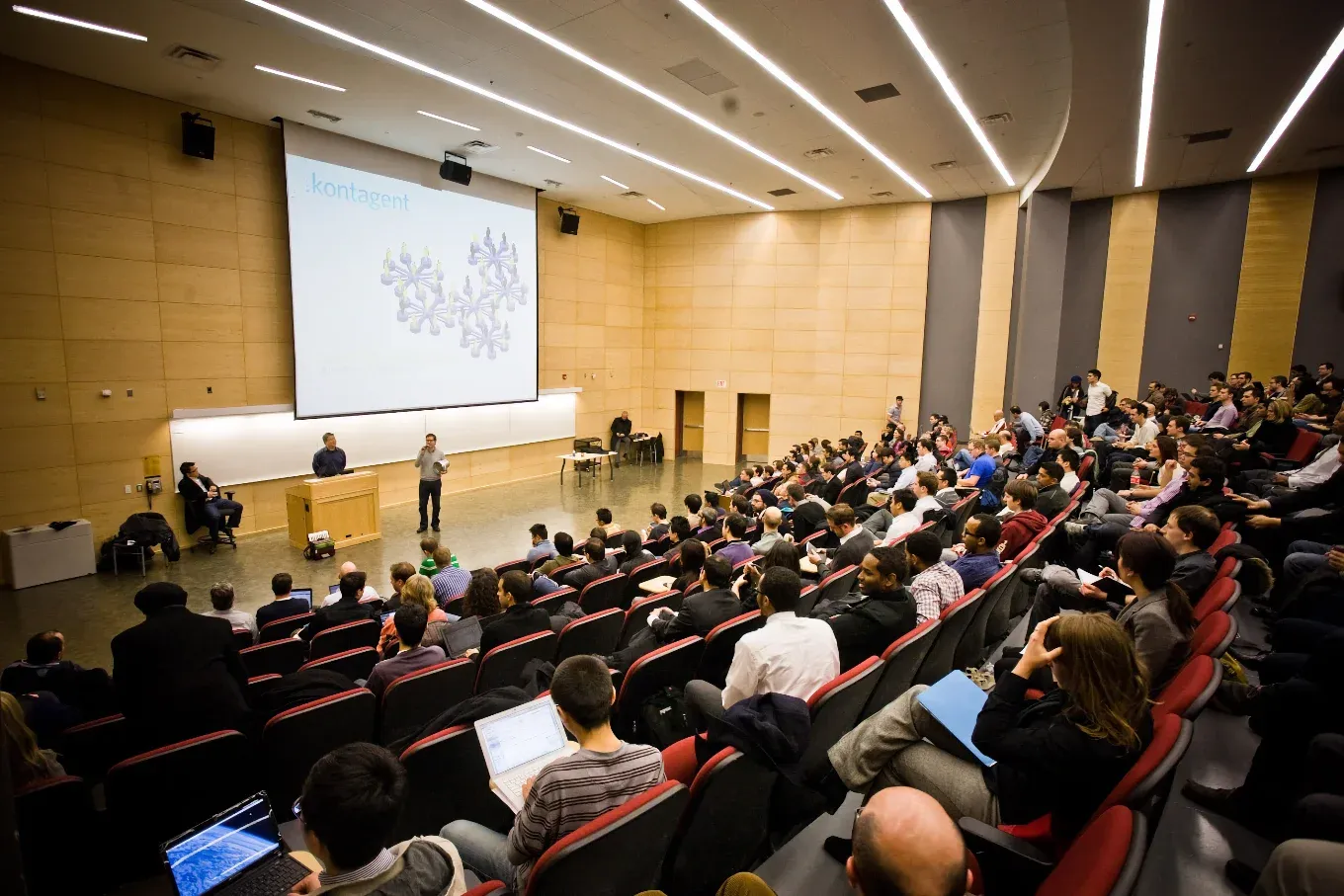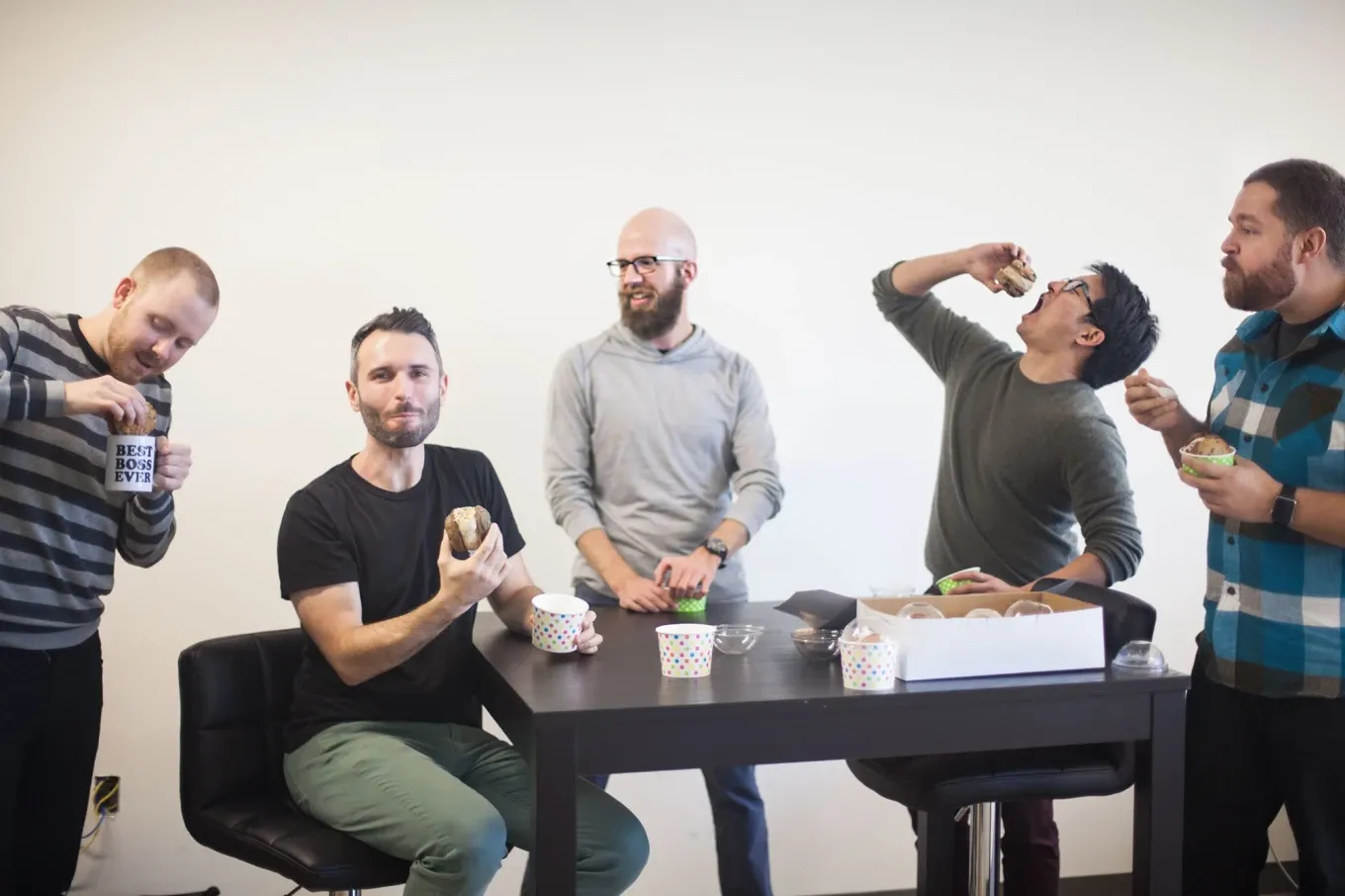The late 2000s/early 2010s was the last time I remember where local communities were a big part of finding success if you were launching a web startup.
I experienced this firsthand in Toronto at a volunteer-run event called DemoCamp, where hackers and tech entrepreneurs got together to demo early versions of their apps/products. You had 6 minutes to present your demo – in person – to an audience of local developers, influencers, and entrepreneurs. If people liked what you’d built, they’d blog about it, and maybe even become your initial customers. This is how a number of Canadian startups like PagerDuty, Top Hat, and Well.ca got their start.
It was just a weird time where the web was taking off as a global application platform, but your ability to find an audience for your stuff was really limited. Social media was pretty much just Facebook and MySpace, which were fine for promoting your band but didn’t work for apps. YouTube was for streaming Lonely Island videos, and Skype existed but most people used it to make cheaper long distance phone calls. And the small-but-influential tech media like TechCrunch never covered anything coming out of Canada.
In that environment, showing off your work meant throwing your laptop into your backpack, plugging into a projector screen, and showing your work to whoever’s nearby. And as an audience member, it meant physically going to these events, meeting people, getting inspired, and taking what you’d learned back home to try yourself.
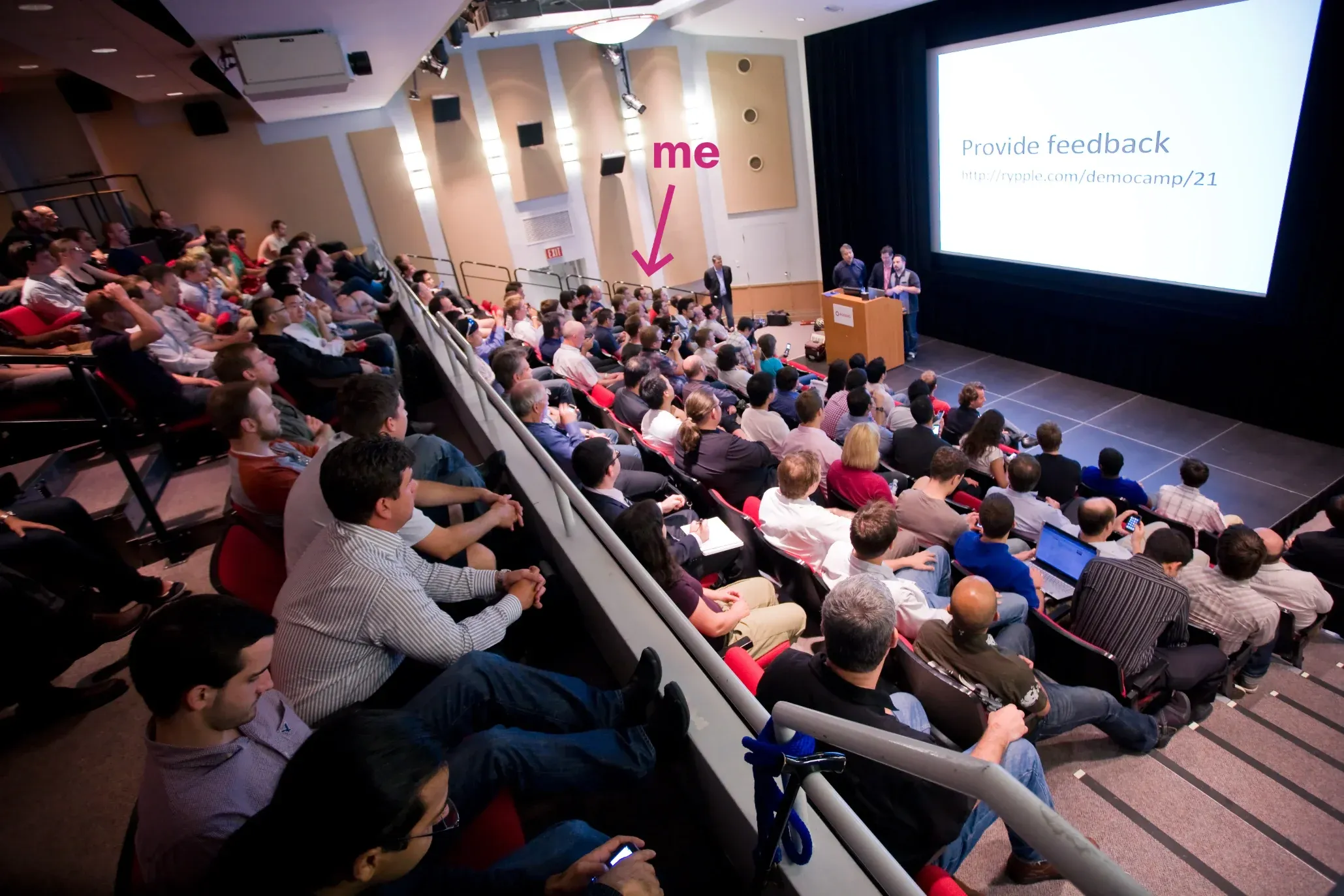
I owe a lot to being a part of this local community: both in inspiring me to get into web development, and years later for their support when my friends and I launched our own web app. I feel a lot of reverence for this era and its stewards, which is why I decided to write this post and share some its history (as I experienced it).
So let’s start at the top.
Inspiring beginnings
The earliest DemoCamp events started as people just sharing new technology and projects. These events were organized and supported by a number of notable Toronto technologists and bloggers: David Crow, Jevon MacDonald, Jay Goldman, and Joey DeVilla. Following in the footsteps of the popular unconference format of the time, you would sign up casually by adding your name to a wiki page, show up at the local venue (usually an office or bar), and typically see 3-4 presentations. It was open for anyone to present or attend.
By the time DemoCamp got my attention, it was DemoCamp 5 (April 2006), which was hosted at a lecture room in the University of Toronto’s Bahen Centre. I was wrapping up my Computer Science degree at U of T at the time, and was encouraged to attend by my one of my profs, Greg Wilson (Greg would later put out a number of influential programming books, including Beautiful Code, which became its own series at O’Reilly).
At DemoCamp 5 I saw two demos that changed my life:
-
DabbleDB was a web-based database editor that was incredibly powerful and slick. It felt like Airtable or Notion databases 10 years before either of those products existed. It was built by Avi Bryant, written entirely in Smalltalk, and completely changed my perception of what web applications were even capable of.
-
A local web consultancy showed off the first “infinite scrolling” implementation I’d ever seen. It used (what was then called) AJAX to dynamically load new content as the user scrolled down the page. Infinite scrolling is the default experience for many web and mobile apps today, but in 2006 we’d never seen this level of smooth interactivity. It blew everyone away, and it was the first time I’d heard the words “Ruby on Rails”.
At this point in my career I was a junior graphics programmer who mostly wrote C and even some assembly. My web “coding” experience was limited to putting a basic Python script behind cgi-bin, or tweaking the grungy PHP code that powered a phpBB forum I ran. But these demos convinced me that the type of experiences you could build on the web was changing rapidly. And new web frameworks like Ruby on Rails were also making it far more accessible.
That weekend I opened up the Ruby on Rails getting started guide, generated some MVC templates and models, and built my first simple app. By summer that same year, I’d quit my graphics driver job, pivoted 100% to doing web development, and started blogging about Rails and Ruby. I never went back to graphics programming.
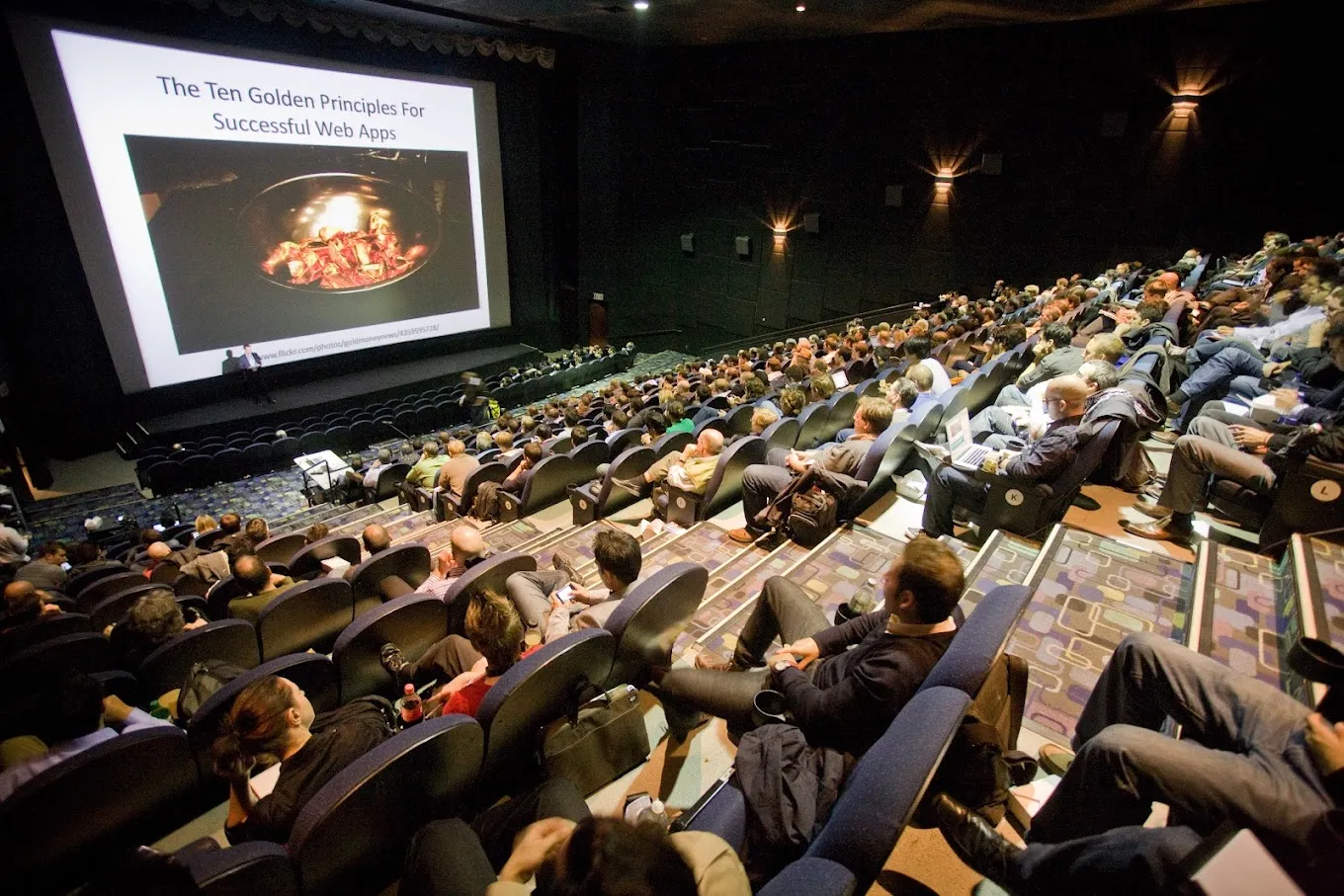
I don’t know that any of that would have been possible without the local DemoCamp scene: not just the opportunity to present, or for the inspiration that led to me even getting in web development to begin with. But additionally for the support of people to become early users, to provide feedback, and to be cheerleaders for what you were doing. And it was all because people genuinely wanted to foster a local technology scene and grow opportunities in the city.
I don’t know that we have this anymore. At least, not in the same way.
The wider DemoCamp community
Within a year, DemoCamp’s popularity and importance in the community grew tremendously. Where the first few events gathered 40-50 people, now DemoCamp seemingly attracted 100+ people. I remember some of these events as being completely packed (“standing room only”).
This attention wasn’t limited to Toronto itself. Since it was an “unconference” style event, anybody could host their own DemoCamp event (and this was encouraged!). By 2007 numerous neighboring cities began hosting their own DemoCamp events, like DemoCamp Guelph, Democamp Mississauga, Ottawa, Montreal, etc. These events all ran the same playbook as the original Toronto event: ad-hoc, anyone can present, 6 minutes, etc.
This wider community of events was really valuable. Nobody cared if you went and gave a demo at multiple events. I think it was even encouraged, as it meant your local scene got some of the same “content” as the big city. So if you had a project to hype, you’d try to present at all of them. Almost like a local pitch deck circuit.
Launching at DemoCamp
This story comes full circle, because by 2009, I now had something to present: Guestlist, which I’d built with Justin Giancola and Jaco Joubert in our spare time. It was a simplified Eventbrite clone that had a nice WYSIWYG editor built on jQuery UI and Ruby on Rails. DemoCamp inspired me to learn Ruby on Rails in the first place, and here we were, demoing a RoR product ourselves just a few years later (technically it was built on Merb, but that’s another story).
When it was time to take the wraps off our creation, we knew that to be successful, we had to get it in front of everyone we could, so I applied to every regional DemoCamp event that had a signup form. None of us had cars, so we’d buy Greyhound bus tickets to get there. None of us had money either, so even a $20 bus ticket felt like a real investment in our futures. We’d show up, open up our laptop, and project our work to an audience of maybe 20-30 people.
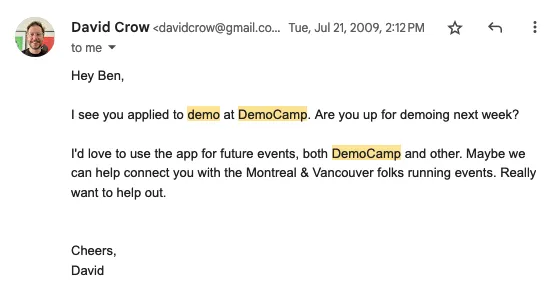
After two successful demos in Guelph and Mississauga, we got the call up to the big show: would we want to present at Democamp Toronto? We were given only one week’s notice, which felt tight, but there would be 100+ people there – and influential ones too. We were psyched and prepared the following 5 minute demo.
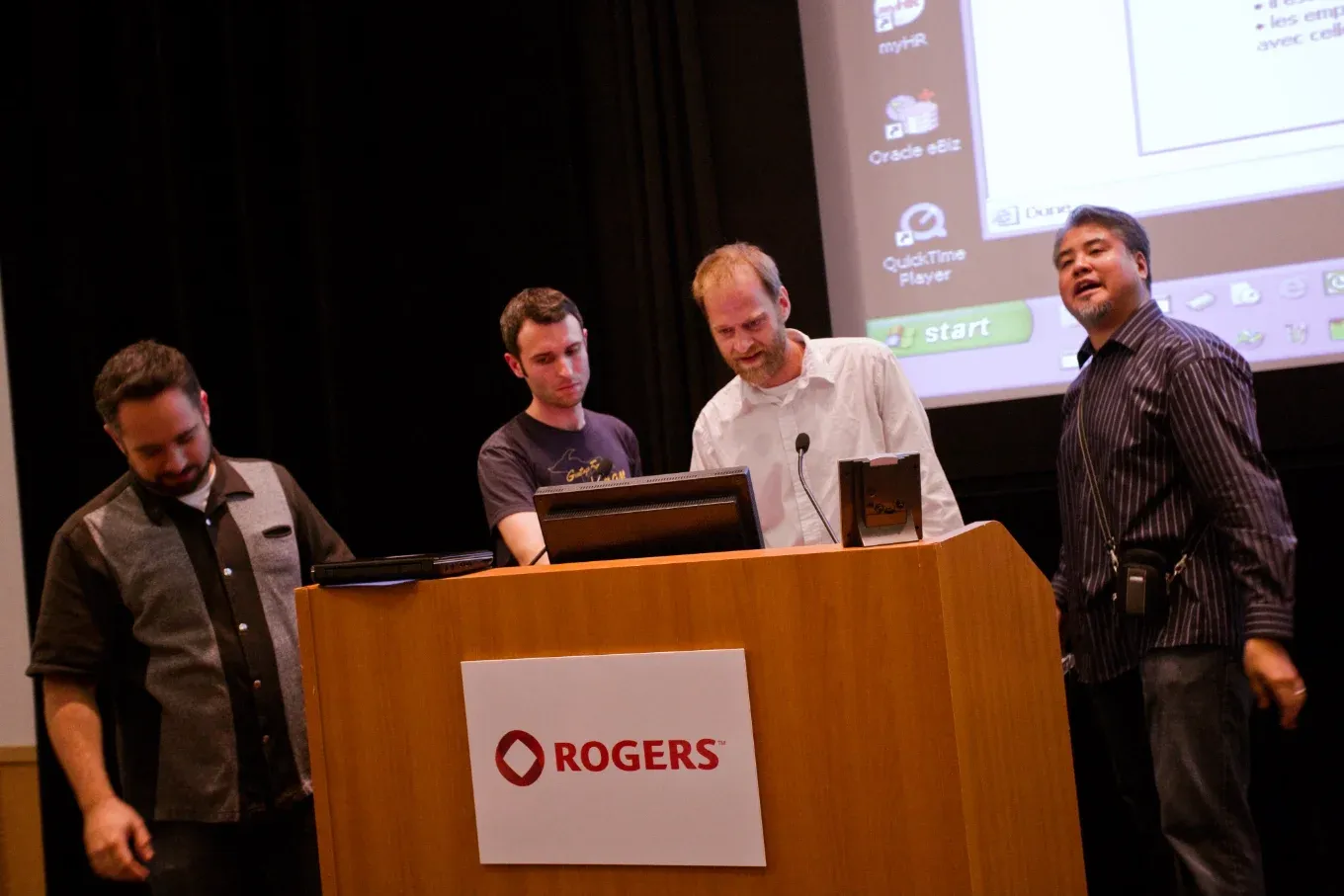
People liked it, and DemoCamp announced then-and-there that future events would be hosted on the Guestlist platform. This move, and the visibility of the event led to folks signing up (mostly local). DemoCamp delivered: we got an opportunity, we made an impression, and we were beginning to get traction.
Guestlistapp managed to eke it out as a very small business selling tickets mostly on behalf charities, fundraisers – that kind of thing. It’s been operating for 13+ years and counting. For a bootstrapped part-time project, shipping something that earned a few bucks and helped people run their events was success enough for me.
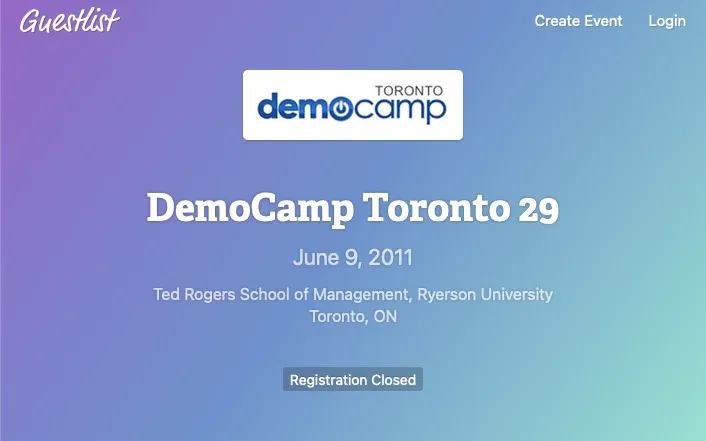
I don’t know that any of that would have been possible without the local DemoCamp scene: not just the opportunity to present, or for the inspiration that led to me even getting in web development to begin with. But additionally for the support of people to become early users, to provide feedback, and to be cheerleaders for what you were doing. And it was all because people genuinely wanted to foster a local technology scene and grow opportunities in the city.
I don’t know that we have this anymore. At least, not in the same way.
The end of DemoCamp
By 2010 I’d moved to San Francisco, and my participation in this community – at least, as a local contributor – came to a close. (I like to think that I still kept in touch with Toronto DemoCamp folks online, some of whom contributed to this post.)
DemoCamp Toronto, as organized by its original founders, wrapped up around 2012. Here’s what David Crow had to say about it then:
[Someone once] described DemoCamp as “DemoDay for companies that aren’t in an incubator”. It was an interesting observation about the role DemoCamp played as a structured social process for entrepreneurs, funders and the community. My challenge is that DemoCamp in Toronto can not continue in the same incarnation. I am hoping to have an open conversation and gather feedback from students, founders, employees, funders about how we make it better. There are lots of events in Toronto. I don’t want to do an event for the sake of an event. I want to build something better, something that solves a need that is a catalyst for success of entrepreneurs.
A few scattered events occurred afterwards by different groups. For example, there was Wordpress Democamp in 2013. The University of Toronto’s Creative Destruction Lab (part of their business school) put on a few events under the DemoCamp moniker in 2015. Most of the wider regional DemoCamp like DemoCampGuelph and Mississauga also ended, but a few are actually still operating today (most notably DemoCamp Edmonton, which had its 54th event this Fall).
I’ve heard a few theories from folks for why DemoCamp “ended” – not just the original DemoCamp Toronto, but the whole wider DemoCamp scene. The answer is probably a confluence of things.
On one hand, the world just became way more connected, and the need for “local communities” just declined dramatically. Access to web development techniques became way better documented and accessible online (e.g. Stack Overflow, YouTube). And if you do hit a snag, it’s easier to find and get help from a supporting community on Discord vs. monthly events downtown. Once you’re ready to launch, it’s just more effective to do so globally on Twitter and Product Hunt than in your local bar.
On top of that, the amount of money piling into tech during the booming 2010s just fundamentally changed things. Incubators got huge: YCombinator went from a batch of 14 startups in 2008 to 114 startups in 2015 (and an incredible 300+ by 2021). And VC money became so seemingly abundant that you could actually launch a new product with $0 revenue and spend millions on Google Ads and conference booths to find customers. Hauling your laptop around and presenting on the projector just can’t scale the same way.
There are some active tech entrepreneurial communities still operating today in Toronto, but they don’t have the same vibe. TechTO is the closest thing to what DemoCamp was, but it’s a business, with memberships running in the hundreds of dollars/year. And while they host free events, the presenters are usually from the CEO and VC set than the indie technologists and bloggers DemoCamp brought together. (I could also argue this switch from volunteer communities to commercial ones is also part of what changed; they have fundamentally different vibes.)
I’ve been back in Toronto for a few years, and I’ve been going in-person to various events, but I’ve yet to find something quite like DemoCamp. It could be I’m out of touch and it’s actually still out there, but I haven’t found it (yet). If you’ve found it, please get in touch – I’d love to learn more.
Closing thoughts
I originally meant this article to serve as a brief retrospective on the impact of DemoCamp on the Toronto technology scene. But the more I wrote, the more I began to recognize the impact it had not just on the wider community, but on me too: for inspiring me to get into web development, and later for supporting my own tech entrepreneurial ambitions. I’ve been fortunate to find some mild success in this industry, and I’m not sure it would be possible without DemoCamp.
I really want to thank David Crow, Jevon McDonald, Jay Goldman, Joey Devilla, Greg Wilson, Brydon Gillis, and the many other community members for all their work and support here. I think you all made a huge imprint on the lives of people who participated in these events, and I don’t know if the Toronto technology scene would be as big as it is today without you. (And as an aside, if the Canadian and/or Ontario governments really want to foster more innovation at home, they should look at what happened here and figure out how to bring it back.)
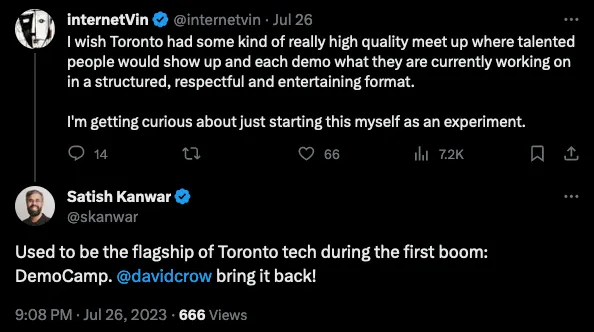
If there’s a glimmer of hope to this story, it’s that other people do share this fondness for sharing tech projects (and DemoCamp), and as recently as a few months ago people have begun picking up the torch and are running it back. A fellow by the name of Vin is firing up a local “New Demos” event next month in Toronto with a lot of the same ethos as the original DemoCamp events. I’m planning to be there. I’m optimistic I’ll find that there’s still appetite and energy for community startup scenes yet.
